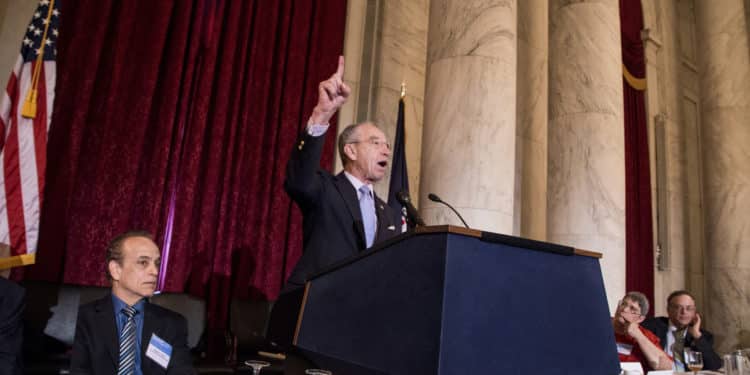On March 12, Senator Charles Grassley (R-IA) sent a letter to Gary Gensler, President Biden’s nominee to be the next Chair of the U.S. Securities and Exchange Commission (SEC). In the letter, Senator Grassley, a longtime champion of whistleblowers, expresses hope that, if confirmed, Gensler will continue the agency’s commitment to its highly successful whistleblower program. Grassley also poses five questions to Gensler which he says will help the Senate understand how Gensler will manage the whistleblower program.
The nomination of Gensler, the former Chair of the Commodity Futures Trading Commission (CFTC), was recently approved by the Senate Banking Committee and will now go to the Senate floor for confirmation. Senator Grassley, the Chairman of the Senate’s Whistleblower Caucus, has played a key role in bipartisan efforts to protect whistleblowers and defend qui tam reward programs, such as those established under the Dodd-Frank Act in 2010. Furthermore, Senator Grassley fought to ensure that 2020 rule changes to the whistleblower program were favorable to whistleblowers.
“Senator Grassley continues to play a leading role in advocating for Wall Street whistleblowers,” said leading whistleblower attorney Stephen M. Kohn of Kohn, Kohn & Colapinto. “While highly successful, the SEC’s whistleblower program is in need of reforms related to the timing of rewards and related action provisions.”
Kohn, who also serves as the Chairman of the Board of Directors of the National Whistleblower Center, urged Gensler to follow the example of former Chairman Jay Clayton, whose staff regularly met with whistleblower advocates, and worked with advocates to improve the SEC program: “We hope that Mr. Gensler will set and example and have an open door policy for whistleblower advocates so we can work together and improve their highly effective program,” Kohn added.
In his letter, Grassley notes that during his time chairing the CFTC Gensler oversaw the implementation of that agency’s whistleblower program. Grassley therefore wishes to know what lessons Gensler learned from managing the CFTC Whistleblower Program and how he would apply these lessons as the Chair of the SEC.
Grassley also details the recent successes of the SEC Whistleblower Program under former Chair Jay Clayton. In the 2020 fiscal year, the whistleblower program set a number of records, including total dollar amount awarded to whistleblowers, the number of individual whistleblowers awarded, and the number of whistleblower tips received by the SEC. Some records have already been broken in the 2021 fiscal year. Grassley highlights the fact that under Clayton’s tenure “the SEC program paid out record amounts to whistleblowers, including the two largest awards in SEC history, valued at $114 million and $50 million, respectively.” Overall, the SEC has awarded approximately $759 million to 143 individuals since issuing its first award in 2012.
According to Grassley, “the maintenance of a strong whistleblower program is a critical component of the SEC’s enforcement arsenal,” and “is not only in the best interest of the SEC but also the American people.” Grassley notes that he met with former Chair Clayton to discuss the SEC Whistleblower Program multiple times during Clayton’s tenure and that Clayton “displayed a willingness to listen to the whistleblower community and carefully consider all of the potential effects of SEC regulations for whistleblowers.” Grassley informs Gensler that he “trust[s] that should future regulatory changes be considered, you will follow the example set by Chairman Clayton and meet with members of the whistleblower community to consider the impact that any proposed changes could have.”
Grassley ends his letter with five questions for Gensler:
- “During your tenure as CFTC chairman, the CFTC did not pay an award until 2014, even though the program was signed into law in 2010. To what do you attribute this delay in whistleblower program awards?
- Under your leadership, the CFTC began using funds from its Customer Protection Fund to pay for administrative expenses, a practice that has created concern in the whistleblower community, but still continues today. The SEC, on the other hand, continues to rely on appropriated funds to pay for whistleblower office expenses. Do you anticipate a change to this policy?
- Do you anticipate making any regulatory changes to the SEC whistleblower program? If so, how?
- Will you commit to providing the whistleblower office with the necessary appropriated funding, resources and staffing to complete its mission?
- The SEC has historically had long delays when it comes to paying whistleblower awards. I introduced legislation in the 116th Congress to address this problem. Chairman Clayton was supportive of these efforts and informed me on at least one occasion that he agreed that processing times were taking too long. Will you commit to working with Congress to improve the processing times for SEC whistleblower awards? If so, how can we work together to continue this important goal?”
Grassley requests that Gensler answer these questions no later than March 17, 2021 “[t]o help Congress better understand how you will manage the SEC whistleblower program in the event that you are confirmed by the Senate.”
